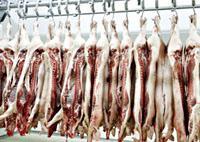
The spread of African Swine Fever (ASF) into every province in China and throughout Southeast Asia in the last quarter has generated new concerns over the industry's ability to respond to world demand warns latest Rabobank pork report. Structural constraints on production growth in some regions, along with infrastructure and logistics capacity constraints, may leave the world with limited supply and mounting competition for potential trading partners.“Mounting losses in the Chinese pig herd due to African Swine Fever are expected to drive a 16m metric ton deficit in pork supplies by year-end 2019,” according to Christine McCracken, Senior Analyst – Animal Protein. Until China gains control of the disease and is able to rebuild, however, it will need to look to other protein sources to meet consumers’ needs. China will need to expand its production of other proteins and ratchet up imports in an effort to fill the gap. Ongoing trade disputes and infrastructure limitations, however, may limit China's options.
Other highlights from the Pork Quarterly Q2 2019 included:China: Producers Remain Cautious on ASF RiskAs the industry surveys the full extent of ASF losses, the challenges of rebuilding its herd, and the potential for reinfection, markets are growing increasingly concerned with projected production shortfalls. Estimated production losses of 25%-35% are expected to create a supply gap that will be impossible to fill in the short run.US: Industry Takes Precautions – Prepares for Strong Export DemandAfter several months of disappointing returns, US hog producers are realizing a nearly USD 50 per head rebound in profitability. This reversal of fortunes is leading some top producers to reconsider expansion plans. While profitable, the industry remains exposed to potential disruption should ASF enter its borders, or should future access to China not be forthcoming.Europe: Belgian ASF Outbreak Ongoing – Industry is Focused on ContainmentEuropean hog producers remain on high alert, as the risks of ASF threatens the ability to meet rising global trade demand. Rising pork prices and the promise of stronger returns may lead to slightly faster growth in some advantaged regions, but the overall production response is likely to be muted by other structural limitations.Brazil: The Light at the End of a Long TunnelA rebound in global pork is likely to benefit few countries more than export-dependent Brazil. Well-positioned to export to Asia, as well as re-established markets in Russia, Brazilian pork producers should see some of the best returns in years. After many challenging export disruptions, we do not expect the Brazilian pork industry to respond as quickly as some others.Click here to download the report
This story was originally published on a previous version of the Meat Management website and so there may be some missing images and formatting issues.















